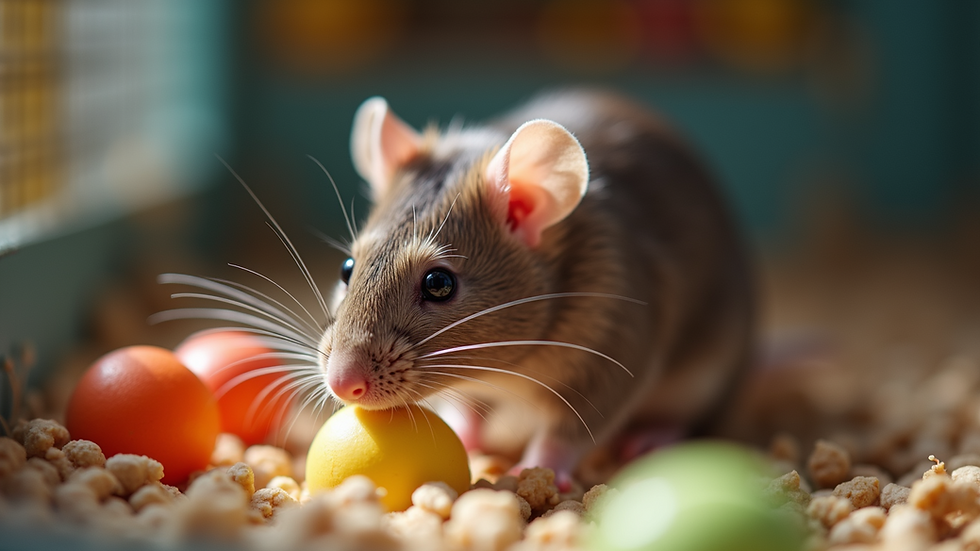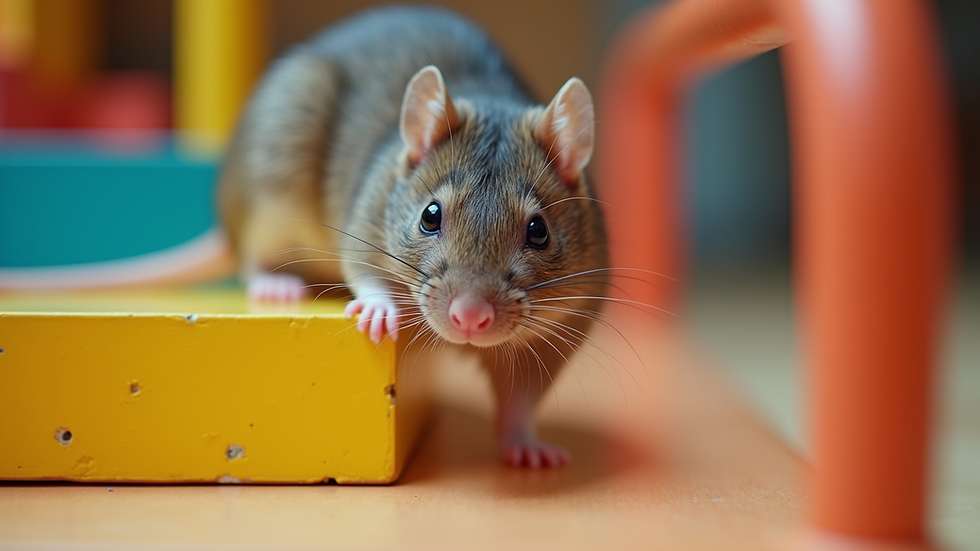How to Provide Excellent Healthcare for Your Pet Rat
- Vaughn Bartlett
- Aug 13, 2025
- 5 min read
Rats are often overlooked as pets, but they can be wonderful companions. They are intelligent, social, and full of personality. However, like any pet, they require proper care and attention to thrive. Providing excellent healthcare for your pet rat is essential for their well-being. In this post, we will explore various aspects of rat care, from diet to veterinary visits, ensuring your furry friend lives a happy and healthy life.
Understanding Your Pet Rat's Needs
Before diving into healthcare specifics, it is crucial to understand what your pet rat needs. Rats are social animals that thrive in groups. They require mental stimulation, social interaction, and a clean environment.
Social Interaction: Rats are highly social creatures. It is best to keep them in pairs or small groups. This helps prevent loneliness and boredom.
Mental Stimulation: Provide toys and activities to keep your rat engaged. Simple items like cardboard boxes, tunnels, and climbing structures can make a big difference.
Clean Environment: A clean cage is vital for your rat's health. Regularly clean their living space to prevent illness and ensure a happy home.
Nutrition: The Foundation of Good Health
A balanced diet is essential for your pet rat's health. Rats are omnivores, meaning they eat both plant and animal-based foods. Here are some key points to consider when feeding your rat:
Commercial Rat Food: Look for high-quality rat pellets or blocks that provide balanced nutrition. These are specially formulated to meet the dietary needs of rats.
Fresh Fruits and Vegetables: Supplement their diet with fresh produce. Good options include carrots, broccoli, apples, and berries. Always wash fruits and vegetables thoroughly before feeding.
Protein Sources: Occasionally, you can offer protein-rich foods like cooked chicken, eggs, or mealworms. These should be given in moderation.
Avoid Harmful Foods: Some foods are toxic to rats. Avoid chocolate, caffeine, and certain nuts like macadamia nuts. Always research before introducing new foods.
Regular Veterinary Care
Just like any other pet, rats need regular check-ups with a veterinarian. Finding a vet who specializes in small animals is essential. Here are some tips for ensuring your rat receives the best care:
Annual Check-ups: Schedule yearly visits to monitor your rat's health. Regular check-ups can help catch any potential issues early.
Vaccinations: While rats do not require vaccinations like dogs or cats, your vet may recommend certain treatments to prevent common diseases.
Signs of Illness: Be vigilant for signs of illness, such as lethargy, loss of appetite, or unusual behavior. If you notice anything concerning, consult your vet immediately.
Grooming and Hygiene
Maintaining your rat's hygiene is crucial for their health. While rats are generally clean animals, they still need some grooming. Here are some grooming tips:
Bathing: Rats do not require frequent baths. However, if they get dirty, you can use a damp cloth to clean them. Avoid using soap unless necessary.
Nail Trimming: Regularly check your rat's nails. If they become too long, you may need to trim them. Use small animal nail clippers and be careful not to cut too close to the quick.
Ear Cleaning: Occasionally check your rat's ears for dirt or wax buildup. Use a soft, damp cloth to clean them gently.
Creating a Safe Environment
Your rat's living environment plays a significant role in their health. A safe and comfortable space can prevent injuries and stress. Here are some tips for creating a suitable habitat:
Cage Size: Choose a spacious cage with multiple levels. Rats love to climb and explore. A larger cage allows for more enrichment.
Bedding: Use safe bedding materials like paper-based or aspen shavings. Avoid cedar or pine shavings, as they can be harmful to your rat's respiratory system.
Hideouts and Toys: Provide plenty of hiding spots and toys. This encourages natural behaviors and keeps your rat entertained.
Socialization and Playtime
Socialization is vital for your rat's mental health. Spend time interacting with your pet daily. Here are some ways to bond with your rat:
Handling: Gently handle your rat to build trust. Start by letting them sniff your hand before picking them up.
Playtime: Allow your rat to explore outside their cage in a safe, enclosed area. Supervised playtime can be a great way to bond.
Training: Rats are intelligent and can learn tricks. Use positive reinforcement to teach them simple commands or tricks.
Recognizing Common Health Issues
Being aware of common health issues can help you act quickly if your rat becomes unwell. Here are some common problems to watch for:
Respiratory Issues: Rats are prone to respiratory infections. Symptoms include sneezing, wheezing, or labored breathing. Seek veterinary care if you notice these signs.
Tumors: Rats can develop tumors, especially as they age. Regular check-ups can help catch these early.
Dental Problems: Overgrown teeth can cause pain and eating difficulties. Ensure your rat has chew toys to help keep their teeth healthy.
Enrichment and Mental Stimulation
Keeping your rat mentally stimulated is just as important as physical health. Boredom can lead to stress and behavioral issues. Here are some ideas for enrichment:
Puzzle Toys: Invest in toys that challenge your rat's problem-solving skills. These can keep them engaged and entertained.
Foraging Activities: Hide treats around their cage or play area. This encourages natural foraging behavior and keeps them active.
Rotate Toys: Change out toys regularly to keep things fresh. Rats can get bored with the same items, so variety is key.
Building a Strong Bond
Building a strong bond with your pet rat takes time and patience. Here are some tips to strengthen your relationship:
Consistency: Spend time with your rat daily. Consistent interaction helps them feel secure and loved.
Positive Reinforcement: Use treats and praise to reward good behavior. This encourages your rat to trust you and engage with you.
Respect Their Space: Allow your rat to come to you on their terms. Forcing interaction can lead to stress and fear.
The Joy of Owning a Pet Rat
Owning a pet rat can be a rewarding experience. They are affectionate, curious, and full of personality. By providing excellent healthcare, you can ensure your rat lives a long and happy life.
Remember, the key to a healthy rat is a balanced diet, regular veterinary care, and plenty of love and attention. With the right care, your pet rat can be a cherished member of your family.

As you embark on this journey of pet ownership, remember that your rat relies on you for their well-being. By following these guidelines, you can create a nurturing environment that promotes health and happiness. Your pet rat will thank you with their playful antics and loving companionship.


Comments